Here are a few of this week’s highlights from WPR’s video section: – This Al Jazeera video breaks the story that Taliban leaders held a secret meeting in the Maldives to discuss Afghan President Hamid Karzai’s reintegration plan. – Two members of the Russian media discuss perceptions of President Barack Obama in Russia as well as U.S.-Russia relations in this WorldFocus video. -Secretary of State Hillary Clinton’s Internet freedom speech at the Newseum raised eyebrows in China.Our video sectionis updated daily. I’ll highlight videos we post there from time to timeon this blog. Got a tip for where we can […]
Russia Archive
Free Newsletter
Secretary of State Hillary Rodham Clinton speaks at L’Ecole Militairein Paris about the future of European security and the United States’role in achieving a secure Europe. Clinton says that the U.S. willcontinue to station troops and build missile defense architecture inEurope. The secretary also had strong words for Russia, admonishing anyspheres of influence Moscow may be trying perpetrate. Click here for a full transcript of her remarks.
WorldFocus’ Daljit Dhaliwal talks with Vladimir Lensky of Russia’sChannel One and former Soviet foreign ministry official SergeyShestakov. Both Lensky and Shestakov say that though Russia and theU.S. have yet to reach a final decision on a post-START treaty,relations are much more amicable now than they have been in recenthistory. Regarding Russia’s neighbors, Shestakov says “influence is thename of the game.” And as far as Russia backing international sanctionsagainst Iran, Shestakov says observers should take a wait and seeapproach as Moscow is being very “opportunistic” with respect tomounting tensions.
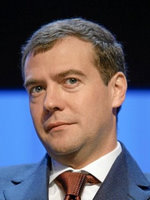
For weeks, U.S. and Russian government representatives have stated that they expect a new nuclear arms control treaty to be signed imminently. Nevertheless, the negotiations continue to drag on. Most recently, U.S. National Security Adviser James Jones and the chairman of the Joint Chiefs of Staff, Adm. Mike Mullen, visited Moscow on Jan. 22-23 to discuss defense issues with their Russian counterparts. Their interlocutors included the head of the General Staff of the Russian Armed Forces and other senior military officials, and members of the Russian team negotiating a replacement to the 1991 Russia-U.S. Strategic Arms Reductions Treaty (START) that […]
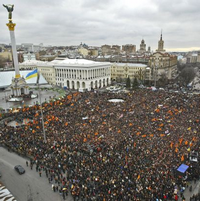
As the dust settles from the first round of Ukraine’s 2010 presidential elections, two things are clear: First, the hero of the Orange Revolution of 2004, Viktor Yushchenko, was decisively defeated; and second, both of the run-off contenders, Yuliya Tymoshenko and Viktor Yanukovych, are likely to follow through on pledges to improve relations with Russia if elected. The last time Ukrainians went to the polls to select a president, the battle between Yushchenko and Yanukovych was portrayed as an apocalyptic clash, presenting a momentous choice for Ukrainians between a bright future with the West and a return to its post-Soviet […]
With 2009 and its year-end Top 10 lists comfortably packed away, the Carnegie Council held an event last week to usher in the New Year with a list of what to worry about in 2010. Panelists included Eurasia Group president — and WPR contributor — Ian Bremmer; the executive director of the U.N. Global Compact, Georg Kell; the editor in chief of strategy+business, Art Kleiner; and the executive director of the World Policy Institute, Michele Wucker. Bremmer kicked things off with highlights from his recently published Eurasia Group report. Here’s a sample from his overall list, with each risk weighted […]
In an illustration of the power of inertia in international relations, reports indicate that India will go ahead and ink a $1.2 billion deal for 29 Russian-made MiG-29s. The two relevant storylines here are the decline of Russia’s defense industry and India’s budding strategic (and security) relationship with the U.S. Neither was enough to derail a deal that will also create its own inertial pull well into the future. This is worth keeping in mind when contemplating scenarios involving major shifts in strategic orientations, of the kind I tend to be fascinated by — a U.S.-Iran rapprochement, an autonomous European […]
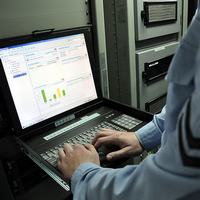
In the past few years, concerns over the growing risk of cyber warfare have been supplemented by evidence of actual cyber attacks, many likely launched with the aid of nation-states. When the United States sounds the alarm on cyber malfeasance, disruption or espionage, China or Russia are typically “the usual suspects.” It’s interesting, then, that a delegation of Russian officials, led by Gen. Vladislav Sherstyuk, visited Washington in November for meetings with officials of the National Security Council and the Departments of Defense, State and Homeland Security. Currently a deputy secretary of the Russian Security Council, Sherstyuk was identified by […]
Russian legislators voted on Jan. 15 in support of a reform package aimed at streamlining cases before the European Court of Human Rights. Human rights advocates welcomed the move, which comes after years of Russian opposition had stymied the process. “This is a long-awaited and positive move. Now more people in Russia and all of Europe will have better access to justice through the European Court,” Human Rights Watch’s Europe and Central Asia Director Holly Cartner said in a press release. The “Protocol 14” reform measure will streamline and expedite the process for hearing cases before the Strasbourg-based court, in […]
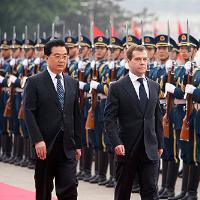
Toward the end of World War II, the godfather of geopolitics, Nicholas Spykman, offered his famous analysis that was to become a rule of thumb for many strategists ever since: Who controls the Rimland rules Eurasia, and who rules Eurasia controls the destinies of the world. Spykman had a point. The two world wars of the 20th century came about largely due to attempts by European rivals to tilt the Eurasian balance of power in their own favor. Russia was always a critical component in this balance, but now, due to the country’s aging population and infrastructure, the 21st century […]
Russian Prime Minister Vladamir Putin joined Turkish Prime MinisterRecep Tayip Erdogan in talks on energy issues as well as otheropportunities to expand the Russia-Turkey economic partnership. Turkey,scrambling to be relevant in an EU landscape, is hoping thatpositioning itself as an energy broker between the union and Russiawill work to its diplomatic advantage.
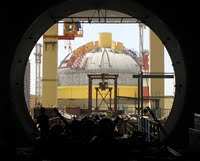
The U.S.-India civilian nuclear agreement, signed in October 2008 after intense bilateral negotiations, is a crucial trade deal for both nations, offering India’s fledgling civilian nuclear industry the opportunity to access sophisticated U.S. technology, while providing American companies with the possibility of significant commercial benefits from the engagement. However, despite the deal’s obvious benefits and the urgency displayed by both countries to get it signed over a year ago, obstacles still remain to making it operational. To finalize the agreement, the Bush administration overruled longstanding U.S. non-proliferation policy by implicitly recognizing India as a nuclear power. The deal was also […]

Last month, the West officially lost the new “Great Game.” The 20-year competition for natural resources and influence in Central Asia between the United States (supported by the European Union), Russia and China has, for now, come to an end, with the outcome in favor of the latter two. Western defeat was already becoming clear with the slow progress of the Nabucco pipeline and the strategic reorientation of some Central Asian republics toward Russia and China. Two recent events, however, confirmed it. On Dec. 14, Chinese President Hu Jintao and the heads of state of Turkmenistan, Uzbekistan and Kazakhstan personally […]
